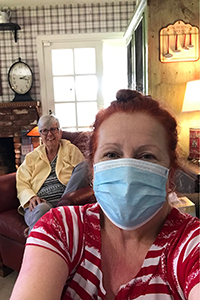By NANCY FOWLER
July 30, 2020
Before the COVID-19 pandemic, Marlene DonVito of Brea, California, regularly visited with her grandchildren, went shopping and enjoyed dining out. One grandson picked her up for Mass every Sunday then took her out to breakfast.

Social worker Leslie Moreno takes a selfie during a rare in-person visit in June with Marlene DonVito through St. Jude Medical Center's "Caring Neighbors" program. The senior services outreach program reduces isolation.
But since March, DonVito has seen her social life dwindle. Church is out of the question. And even on the less frequent occasions when she sees her grandchildren or sits outside with neighbors six feet apart, the 88-year-old who's legally blind misses the hugs she used to enjoy.
"I love having company; I love having people over," DonVito said. "But social distancing makes it very hard for that to happen."
Still, DonVito, who lives with her son, feels less isolated than many. And she's confident she'll be able to enjoy a full social life again. But others who are experiencing a loss of contact with people during the pandemic may be at increased risk for mental illness, substance abuse — and even death.
As many as 75,000 Americans could die from drug or alcohol misuse or suicide — fatalities that fall into a category called "deaths of despair" — stemming from the coronavirus, according to a research brief published by Well Being Trust and the Robert Graham Center for Policy Studies in Family Medicine and Primary Care. The Well Being Trust is an independent national foundation launched by Providence St. Joseph Health in 2016.
The brief cites current and likely ongoing isolation among the risk factors for these projected deaths, along with economic failure, massive unemployment and uncertainty.

Dr. Waghray
Dealing with so many dire challenges at once is almost unprecedented, according to Dr. Arpan Waghray, chief medical officer of Well Being Trust.
"We have not seen this combination of isolation and uncertainty, to this extent, in any situation in recent memory," Waghray said.
From optimism to anger
In March, as the pandemic became a reality in the United States, there was a sense that "we're all in this together," a mindset that takes hold early on in many disasters, according to Waghray. He's also a geriatric psychiatrist and system director for behavioral medicine at Swedish Health Services, an affiliate of Providence St. Joseph.
"There's this adrenaline rush, so people and communities come together — we want to be there for each other," Waghray said. "And that's generally followed by this sense of optimism, that everything will return to normal."
But as people began to realize that social distancing could last for much longer than initially thought, disillusionment set in, Waghray said. "And then optimism turns to discouragement, stress, anger."
Those feelings, now percolating in a brew of isolation and loneliness — and exacerbated by unemployment for many people — may lead to unhealthy coping mechanisms including abusing alcohol and other substances.
"People with alcohol-use problems depend on their social networks and AA programs to stay connected," Waghray said. "Now they are more isolated, which increases risk factors across the board."
Everyone handles isolation differently, Waghray said. Some may find that being alone doesn't lead to loneliness. But even social distancing is more problematic for others. Outgoing people may have initially mitigated their loneliness by connecting with coworkers, friends and family through video meeting apps like Zoom. But for some, virtual contact is wearing thin.
"'How long can this last?' can become 'What now?'" Waghray said.
A vacation from worry
Many people are now experiencing a new semblance of normalcy as they go back to their workplaces, according to social worker Amber Lehman-Myers, of the Avera Medical Group Behavioral Health Clinic in Sioux Falls, South Dakota. But until a vaccine is widely administered, normalcy will continue to be a relative concept.

Lehman-Myers
"People are starting to think about Labor Day and Thanksgiving and Christmas," Lehman-Myers said. "What are those events going to look like?"
After being hunkered down in the early spring when schools switched to virtual curriculums and millions began working from home, college spring breaks and the start of summer unleashed young people ready for up-close socializing without masks and without regard to social distancing. Video of a packed pool party at a resort area in central Missouri over the Memorial Day holiday went viral for its open flaunting of social distancing. Pictures of crowded bars and beaches soon became commonplace on social media.
"They wanted to enjoy the nice weather and have get-togethers, and to take their vacation time," Lehman-Meyers said.
As more states began to open up their economies, mask wearing was mandatory in some jurisdictions and deemed a matter of personal choice in others. By midsummer, community transmission had ignited widespread outbreaks around the country and authorities were beginning to walk back reopening plans. Experts doubled down on their calls for wearing masks in public, frequent hand washing and renewed adherence to social distancing.
Too close for comfort
For people of all ages, social distancing can be frustrating, but so can too much togetherness. Beginning in April, Lehman-Myers began to see more patients with depression and thoughts of suicide, a trend that has not let up. Stress is accumulating, she said. In some families, divorces are on hold while in others, loved ones are unable to return home because of travel restrictions or concerns about traveling by public transportation.
For some, home has become a cauldron of intense feelings. Parents can be more prone to snapping at their children. Children may be angry, worried about the future and missing their friends and grandparents. A sense of isolation from the wider world can set in even as immediate families shelter in place together. Parents struggling to home school, feed and entertain their children while working full-time jobs from home sometimes see their children become resentful of families whose lives don't seem to have been changed by COVID-19.
"Children can be jealous when another family down the street is having pool parties and picnics," Lehman-Myers said. "And that can create some tension."
But some families are experiencing a new closeness, and some single people are seeing their friendships deepen, Lehman-Myers said.
"With each other and in therapy sessions, people are sharing more of their struggles and traumas," she said. "So, there is some healing happening during the time of COVID-19."
'Cheer a Senior'
To help older people cope with ongoing isolation, a Fullerton, California, effort called "Caring Neighbors" is expanding its reach. The program, part of Senior Services at St. Jude Medical Center, a member of Providence St. Joseph Health, now serves 400 people compared to 68 before the pandemic.

Dupée
The increase is part of a new initiative called "Cheer a Senior." Sixty volunteers — some of whom were furloughed hospital employees with unexpected free time on their hands — offered to make regular phone calls to seniors. Cheer a Senior was put in place following a flurry of requests, according to Karyl Dupée, Senior Services' clinical supervisor.
"People would email us and say, 'Hey, would you mind contacting this individual?'" Dupée said, "Or people from the hospital would say, 'I have a neighbor' or 'Would you mind calling my aunt or my uncle?'"
Marlene DonVito has been a "Caring Neighbors" participant for several years. Before the pandemic, she and social worker Leslie Moreno visited through the program once or twice a week, often while running errands or shopping for gifts. Now DonVito and Moreno's visits are mostly limited to a phone call every week or two.
"We talk about books, we talk about food," DonVito said. "We talk about my relationships with my stepdaughters and my son — a lot about family dynamics."
Even though their time together is more limited, the continuity of their special friendship helps DonVito maintain her positive attitude.
"It's an integral part of my life," DonVito said.
Copyright © 2020 by the Catholic Health Association
of the United States
For reprint permission, contact Betty Crosby or call (314) 253-3490.